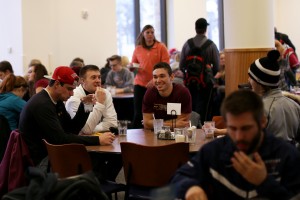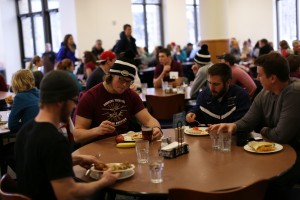Helping or hurting our community?

Around campus, you can hear whispers of certain organizations being represented more than others. Within the Concordia community, college organizations have created various cliques, defined by students’ interests.
Freshmen social work major, Hayley Gunderson, has noticed the different ways in which organizations have been recognized. She believes that amongst the organizations, choir has been recognized the most.
“Our choral program has been recognized a lot because our school is well known for it,” Gunderson said.
Gunderson has heard theatre members get upset when students don’t know much about their upcoming performances, such as Les Misérables. She also stated that some organizations have little representation on campus.
“Certain clubs are shown off at the beginning of the year,” Gunderson said. “After that, you forget they exist unless you are on their email list.”
Freshman elementary education major, Alexis Scanlon, is a member of Cantabile Womens’ Choir. She agrees that choir does get more recognition, but that it is expected with the sheer size of the program.
“The fact that we have about 300 choir people means the word about our choir program gets out there more often,” Scanlon said. “A group or club with only about 20 people may not have as many publicized events.”
According to Johnson, the unequal representation and awareness of some organizations on campus can put a strain on a student’s decisions to join more than one clique.
“[Unequal representation] makes people not want to branch out as much,” she said. “It keeps people stuck in their ways. They’re not wanting to do anything new.”
Gunderson believes the cliques don’t hinder the community.
“[The Cliques] make us more of a community,” she said. “Even though we are involved in different activities.”
Being a member of Cantabile, the freshmen womens’ choir, she believes cliques on campus make it warmer and give her a sense of home.
“They make sure everybody has somebody to relate to,” Gunderson said.
Senior Ryan Lawler agrees with Gunderson in the sense that cliques strengthen the Concordia community.
“Different groups may not mesh completely, but they all have commonalities and can build communities among certain groups or interests,” Lawler said.
A major in business health care administration and long-term care, Lawler is involved in the Student Health Care Management Association, and used to be on the football team. He said each clique has a specific role, whether it be to obtain experience for a major or to help the local community.
Gunderson, Lawler and Sophomore Kayle Johnson all noticed that the cliques are very visible on campus.

Johnson has seen the cliques most present in DS.
“Most people seem [to] have their own tables,” Johnson said.
Johnson, a communications major, is a member of Girls in Real Life, Homecoming 2014 and a former member of track. Seeing cliques on campus, especially in other sports, is nothing new to her.
“Most of the time [teammates] are always with each other and that’s normal,” Johnson said. “I come from a really small school. It was exactly like that so it’s normal to me.”
From her perspective, Johnson believes that cliques are formed because they provide people with a sense of security.
Gunderson and Lawler have noticed the positive effects that the cliques seem to have on campus; however, they both thought that some organizations are not given the same recognition as others.
Despite her belief that student’s might be reluctant to branch out because of unequal representation of various organizations, Johnson has joined other cliques herself.
“I know I have met a lot more people since I have branched out,” Johnson said. “One of my roommates was in choir and the other one was in track with me …. I have a whole different, new friend group between both of them.”
Lawler believes that football, along with hockey and basketball, might get more “face time” but “other [organizations] get recognized for the individual achievements they work towards.”
Lawler believes that the only way the cliques would become negative is if they were exclusive. He stated that a lot of the cliques built themselves and branch out among other groups. Lawler said that it “builds a community for individuals.”
According to Lawler, students may get involved with an organization or group in fear of not having friends. Once students have that friend group, it all comes to what fits their interests Lawler said.
“Once you settle in on a major or concentration, you fall into a certain group or club that happens to fits yours,” Lawler said. “A lot of it is to be a part of something.”

